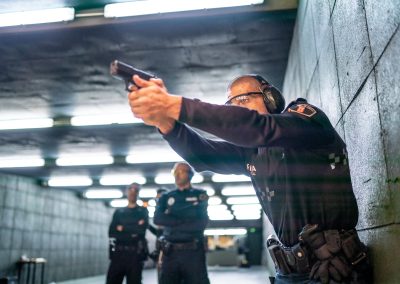We’re a few weeks into 2015 and I suspect some of us are already losing sight of our New Year Resolutions. The five most common, according to StatisticsBrain.com, are: 1) lose weight, 2) get organized, 3) spend less (save more), 4) enjoy life to the fullest, and 5) stay fit and healthy. The harsh reality: we almost always fail to realize these lofty goals.
What about you? What did you want to do different in 2015? What are your professional resolutions? If you skipped it at the New Year, consider now: What do I want to do different this year?
I’ll offer this: we are working in volatile times. Lurking is a small percentage of people who want to hurt us—or worse—just because of the uniform we wear and what we represent, regardless of whether you are local, county, state or federal.
To paraphrase the great risk manager Gordon Graham: if you aren’t constantly improving, you’re getting rusty.
Training
Take an honest look at yourself right now. HONEST! Are you confident in your firearms skills? Hand-to-hand combat? Driving? Case law? Communication skills? Less-than-lethal tactics? Traffic-stop tactics? Again—HONEST!
Most agencies don’t have the time, money, or resources to provide their officers with additional training beyond what is required of their governing body (I said “most agencies”; there are exceptions). Therefore, it’s up to you.
During our seminars the number one complaint we hear about agencies and firearms training is: “We’d love to shoot more but the ammo is expensive.”
Fine. If you’re unable to conduct live fire then practice dry-fire exercises. Draw your weapon from a seated position with your seatbelt on, draw your weapon and aim the weapon out the driver and passenger side windows, as if simulating a response to an ambush. Try lying down in the cruiser seat and drawing your weapon. Lie on the ground and draw your weapon from various positions: on your back, stomach, and side.
You don’t have to be a firearms expert—I’m certainly not—in order to feel more comfortable with your weapon and dramatically improve your skill level. (Note: Before doing any of this, use common sense and unload your weapon).
Supervisors: If you aren’t using every roll call as an opportunity to train your people—start now! If you only have five minutes to show a video of a traffic stop, do it. If a recent court decision has been decided research it and discuss it. Don’t pass around a piece of paper and tell you folks to read it and initial. That’s not leadership and no one will retain the information.
Similarly, if you see your officers doing something that they could be doing better (or safer), it’s your role to say something! Unfortunately there are supervisors who don’t want to be the bad guy. Does this sound familiar? “That’s just the way he is.” If you turn a blind eye on an officer not following good officer safety tactics, you’ll have to live with that if the unfortunate occurs.
And officers, don’t wait on a supervisor if you observe a fellow officer not doing something correctly.
Often a fellow officer will appreciate another officer mentioning it, as opposed to a supervisor. Remember: stripes don’t make you a leader.
There are so many free training resources out there, there’s simply no excuse. A simple keyword search will bear this out.
Commitment & Dedication
This year has been filled with stories and articles written about “riots,” “police militarization,” “use of force,” “choke holds,” “body cameras” and more. It’s very easy to “give up.” In fact, I read and re-posted several great articles on this exact topic. It’s tough to care during these times. I get it.
The commitment I’m talking about is the commitment for each other. It seems that it always takes an officer’s funeral or some other crisis to really bring cops together. Let’s change this in 2015.
Being able to teach throughout the country has allowed me to spend time at some incredible agencies. Many of these departments are like a big family. Others—the majority—are dysfunctional for a plethora of reasons. Time and energy is spent worrying about who the chief is or where the city manager is instead of taking care of one another.
If I ask you to once again take an honest look at yourself, would you? Would you be happy with who you are? Happy with the way we as professionals treat each other? The way we talk about each other behind each other’s backs?
If you’re a seasoned veteran, are you the same person today who you were when you started? How have you changed over the past 5, 10, or 30 years? If you’ve changed for the worse, then why? Are the things that “piss you off” really that big of a deal? If you died tomorrow how would you be remembered? HONEST.
Let me tell you, I’m just as guilty as the next cop. There have been days where I wanted to quit. I can remember getting so “worked up” over something that I had no control over that it consumed my life for hours, days and weeks. This type of frustration doesn’t stop when you leave the station. It’s a poison that travels home with you and can become unhealthy and even deadly (research police suicide).
We’re going to experience ups and downs in our careers. We know this. Therefore, let’s set a professional resolution in 2015 to spend more of our time and energy on things we can control and fix, and less time on things we can’t.
Supervisors! Don’t allow yourself to get caught up in the “drama.” You’re supposed to be a leader! Be better than that and lead by example. How can you expect your people to treat each other better if you are badmouthing fellow co-workers, supervisors or administrators? Whether you realize this or not, you are actually losing respect for yourself.
Set supervision goals for yourself in 2015. Get to know your people if you don’t already. Buy them lunch on their birthday, send them flowers when a loved one in their family dies, and visit them at the hospital for the birth of their child. Spend more time in 2015 writing up “attaboys” as opposed to counseling and discipline reports.
When one of your officers makes a good arrest, takes guns and drugs off the street, show them your appreciation. Again, if you are already doing this, keep it up! If not, make changes and become a better supervisor and person!
I was recently teaching a seminar and had a 30-year veteran walk up to me and said: “I’m paying for this out of my own pocket because it’s that important!”
That’s the kind of dedication and commitment I’m talking about. Veteran officers like this are an inspiration to everyone they work with. Remember: Each of us has a responsibility to improve the agency we work for. I’m not saying you need to be all smiles and hugs, but keep things in perspective. Do your part to make things better.
Closing
Look yourself in the mirror and take the honest self-assessment of who you are today. If you aren’t who you want to be or where you want to be, then use the New Year as an opportunity to make resolutions and set goals for yourself. Sign up for Calibre Press seminars and our Newsline, research police websites, finish that college degree or get an advanced degree. Do something to make 2015 a great year!
Stay safe!










0 Comments